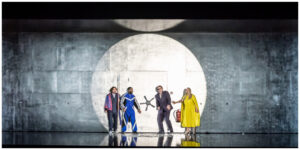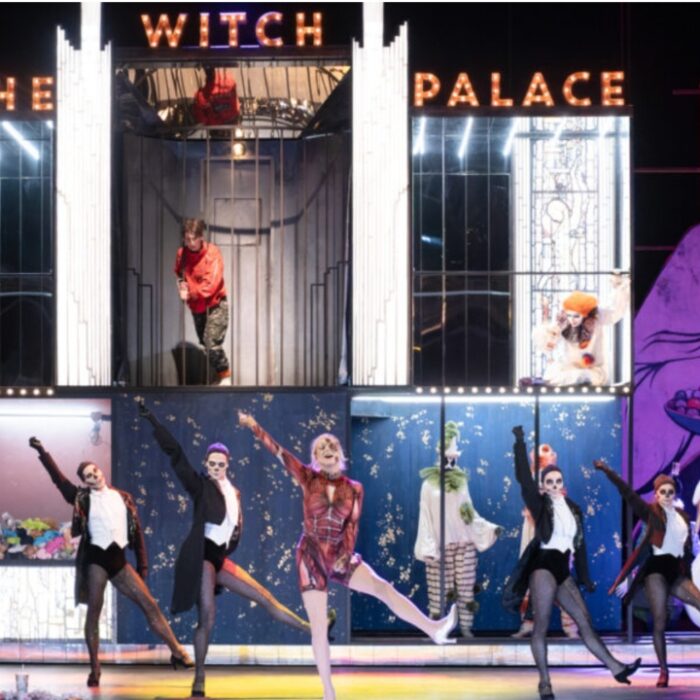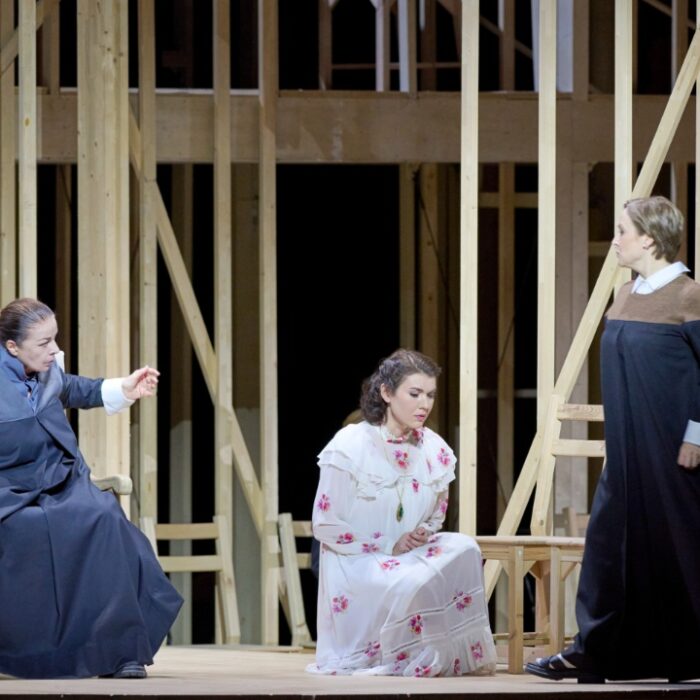
English National Opera 2022-23 Review: The Rhinegold
Storytelling and wit at the forefront of Richard Jones’ latest installment of ENO’s ‘Ring’
By Benjamin PoorePhoto Credit: Marc Brenner
English National Opera has had a stay of execution from the swinging cuts imposed on them by Arts Council England before Christmas. At least another year of funding is guaranteed, though it has not come without casualties; the “Siegfried” planned as the next installment of their burgeoning “Ring” has reportedly been pulled. A pity, as Richard Jones’ barnstorming new production of the first part of the tetralogy “The Rhinegold,” has shown the company to be in rude artistic health.
The Failures of the Gods
It begins with the backstory to the backstory, which is normally only narrated by the Norns in the prelude to “The Twilight of the Gods”: a naked man drags a shattered trunk across the stage; as he crosses back and forth each time he is wearing more and the wood is crafted into Wotan’s spear. It’s not in the score, but it’s a powerful dramatic intervention. We know, then, that it isn’t Alberich’s theft that breaks the natural order of things but a trend set in motion by the leader of the gods himself. When the same beats are used to show Alberich working the stolen gold into the ring, we know that this is quite simply the way of this world.
The failures of the gods are writ huge in the production. In the very final bars, they enter not a golden fortress but a gray bunker to ride out the apocalypse they have, themselves, set in motion; Wotan pulls down the shutters as the Rhinemaidens hammer on them in despair at his selfishness and cowardice. It’s a loveless world, and Freia’s apparent reluctance to join the gods in Valhalla is keenly felt—and the tender portrayal of her relationship with Fasolt, on whose closed eyes she places a handkerchief after his murder, is touching and humane.
It’s a contemporary setting with plenty of Jones’ cartoonish touches and not a little wit. Alberich goes from an awkward, floppy-haired incel who is rejected by athletic rhinemaidens to suited middle-manager-cum-cop; his doppelgängers truncheon the hapless Mime with brutality redolent of scenes of police violence on the television; the Tarnhelm becomes a symbol of surveillance and state power. The giants are boiler-suited builders who collect their payment in an articulated truck, which is gathered in pallets; Nibelheim is a grim factory floor with cold strip lighting. But the central images of the drama—Tarnhelm, spear, and gold—are handled with clarity, and their narrative importance is articulated and felt.
Designs by Stewart Laing are bold and compelling. The backdrop to the open set is made of great vinyl ribbons, which shimmer seductively and also sleazily in the light, suggesting both water and gold. The concluding rainbow is made of great streams of glitter that fall endlessly from the flies in what is a stunning spectacle; the sudden gray of the encroaching bunker as it moves downstage brilliantly undercuts it and chimes perfectly with the ironic, empty pomp of Wagner’s score at the conclusion.
John Deathridge’s translation, which sat awkwardly in last year’s “Valkyrie,” has found a much happier fit with the score this time around. “The Rhinegolds'” chatty character fit Deathridge’s idiomatic vision of the text well and adds both spice and earthiness to what can be rather portentous, philosophically-freighted exchanges of dialogue. Colloquial figures chime well with Jones’ down-to-earth production and Laing’s costumes.
Some moments are clunky. Alberich’s transformation into a great lizard is neither truly spectacular nor bathetically understated (often a duff moment in this opera). Donner’s hammer-throwing made him out to be an athlete, perhaps a long-range connection to the lycra-clad Rhinemaidens. The overall effect was rather empty.
The Powerful Ensemble
With fourteen singers, “Rhinegold” is a true ensemble piece. John Relyea’s Wotan follows Matthew Rose’s last year in bending towards the bass end of bass-baritone. Although his final peroration was a little cloudy, a common enough affliction at that stage in the piece. Admittedly, his soft-grained voice told us of Wotan’s dreams, mainly delusions, in a sumptuous opening phrase for Scene two. Physically he was relatively understated, certainly compared to Leigh Melrose’s Alberich and Frederick Ballentine’s Loge, whose energies drove the entire show forward whenever they were onstage; it served to underline the importance of Wotan’s chief critics – the Nibelung and the demi-god – in the piece, rather than excavate his psychology.
Leigh Melrose gives a mesmerizing performance as a hyperactive Nibelung. Vocally, he takes no prisoners. This is a singer who has given an equally compelling “Wozzeck” in the same house around a decade ago, and it is this willingness to experiment that gave the character a special sense of danger and transgressive power in performance; rasping, howling and moving (too) with great menace and desperation. Frederick Ballentine’s Loge is another show-stealer. He is a slighter physical and vocal presence than Relyea and cuts a nimble contrast with his luminous gloves, giving a mercurial performance. Diction is like cut glass, and the sheer crispness and clarity of his consonants showed just how utterly absorbing singing in the vernacular can be.
Christine Rice’s Erda was as silken and luxurious as her pink pajamas. James Cresswell and Simon Bailey sang with effortless clarity in crisp, humane portrayals of giants Fafner and Fasolt. The trio of Rhinemaidens – Eleanor Dennis, Katie Stevenson, and Idunnu Münch – sang with brio and electricity. John Findon’s Mime never squawked and came over tenderly; likewise, Katie Lowe as Freia. Madeleine Shaw’s Fricka had plenty of steel in her sound, and one sensed in it the same ruthless resolve and lust for power as Relyea’s Wotan at his most commanding.
Martyn Brabbins steered a steady ship with the ENO orchestra. It was not the quickest “Rhinegold” ever delivered, but Brabbins kept the music on its toes, and there was never a feeling of torpor. Balance was excellent throughout, and the score is relatively unobtrusive. In the best possible sense, it is like watching a play whose emotional and dramatic character is sculpted by the music rather than imposed over the dialogue. Brass playing was a little murkier than ideal, though resplendent in the final bars; woodwind playing was pointedly phrase and brim with character. The recorded stereo-effect of the anvils was compellingly immersive as if we were in Nibelheim ourselves. After a mixed start last year, Jones has shown himself to be a skilled storyteller. Let’s hope Arts Council England lets us see the rest of it.



